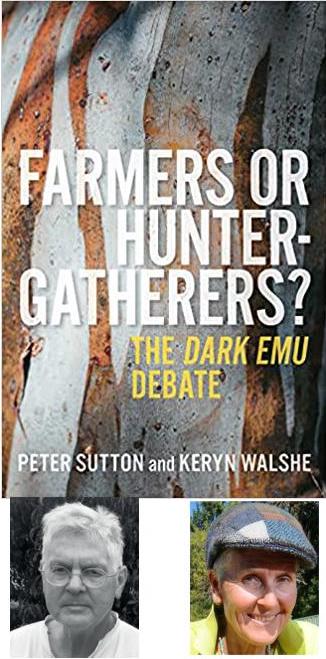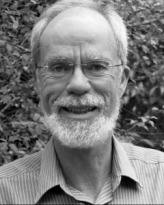 The concluding words of Peter Sutton in his critical response to Dark Emu could have been addressed directly to me:
The concluding words of Peter Sutton in his critical response to Dark Emu could have been addressed directly to me:
People keep telling us, even those who are aware of Dark Emu’s many flaws, that at least it has got people thinking about an important subject. We hope their interest continues, and that the tens of thousands who have read the book go beyond it and keep learning more from other sources. So long as Dark Emu is not the agent of their entrenchment in a dogmatic view, that is good. So long as we remain open to debate and a respectful exchange of views, in a shared space and not from behind walls, it is more than good. It is in that spirit that we offer this book to the reader. — Farmers or Hunter-Gatherers? p. 201
I confess I was one of the readers of Dark Emu who felt a bit edgy over some of its emphases and its “slightly misdirected” ideological focus but for all of that still found myself saying “I’m glad I read it” and commending it to others. Two scholars, Peter Sutton and Keryn Walshe, have been much more clear-headed and confronted head-on the book’s often misleading emphases and “quite misdirected” ideological focus.
There is no better condition for relationships than truthfulness. We have tried here to set part of the record straighter than it has become through the popularised mythology of history of the kind found in Dark Emu. We have done so in a positive spirit, but also a corrective one. The Old People—the First Australians—and all of us deserve better than a history that does not respect or do justice to the societies whose economic and spiritual adjustment to their environment lasted so well and so vigorously until the advent of the colonies and the subsequent degradation of much of that environment through land clearing, pastoral stocking, and the spread of feral animals and plants.
Pascoe, by consistently gilding a lily that needs no gilding, suggests that he sees a foraging way of life as inferior. . . .
. . . .
In this book we have grappled with Dark Emu’s mixture of positive factual information and its tendency to trim the evidence to fit the author’s model, its lack of true scholarship, its ignoring of Aboriginal elders’ knowledge, its disturbing social evolutionist philosophy, and its overwhelming attention to the material aspects of Aboriginal food production to the exclusion of the rich spiritual propagation philosophy of the Old People’s culture. (p. 200)
Years back I found myself impressed with an exhibition at Melbourne’s Museum of Victoria that showed a diorama of Aborigines apparently living in a settled life in stone houses and engaging in complex aquaculture in a part of western Victoria. I have been out of date for many years, not realizing that the message of that exhibition has long been superseded. A chapter by Keryn Walshe reassured me that I was not mistaken in my initial impressions but also made it clear that my source was wrong:
The vision of ‘hundreds of people living in villages’ had gone unquestioned and become all-pervasive, as witnessed in a former diorama at the Museum of Victoria that depicted a scene at Lake Condah with the caption: ‘The Kerrup-Jmara did not need to move house, and their villages of stone were probably permanent. Several hundred people lived in some villages.’ This exhibit was complemented by educational resources designed by VAS, conveying the same image of permanent stone houses set out in villages. (p. 183)
Further studies have shown that stones were used for a few dwellings but only as supports for wooden posts, and the dwellings were not occupied permanently either. One of the main criticisms of Sutten and Walshe is that Bruce Pascoe, the author of Dark Emu, has singled out the exceptional that has been found in one or two places and presented it in such a way as to hide what was far more typical of Aboriginal ways of living.
The term “village” is itself problematic. Pascoe quotes from explorer diaries records of coming across large clusters of dwellings. In my own mind, I reconciled these accounts with what I knew of at least some sort of nomadic or wandering existence by noting that the same descriptions appeared to assume that their dwellers had gone elsewhere at the time. Sutten and Walshe make it clear that the word village implies a permanent settlement, and even a permanent settlement plus, with markets, special public purpose spaces, etc. A more correct term would be “encampment”. Ditto for the storages of food that the explorers tended to come across. Such storages were far more likely to be kept for occasions when multiple tribes visited the site for, say, annual ceremonies.
I found myself nodding in full agreement when Sutton and Walshe drew attention to Pascoe’s implications throughout Dark Emu that the image of Aboriginal life as “merely” “hunters and gatherers” suggests to us today that they were inferior to other peoples. Pascoe appears to be trying to rebut a pervasive racist view of Aboriginal inferiority but does so by trying to show how “like white Europeans” or “like Chinese” they were technical nous. As Sutton demonstrates most thoroughly, Pascoe is charging a windmill:
How, then, can Pascoe defend his argument that Aboriginal people in popular imagination subscribe to ‘a belief in the brutish description of Aboriginals that Australian history insists we accept’ (page 100)? Who are these insisting ogres? Isolated pub racists? So-called ‘culture warriors’? Australian history writing, including the TV versions of it, moved way beyond that colonial-era delusion long ago. The multiple volumes of historical correctives to colonial frontier ‘pioneer’ mythology published by Henry Reynolds and other historians since the 1970s are in thousands of households. Their role in correcting the jingoistic settler histories of the past, in which ‘brave pioneers’ battled against ‘a harsh environment’ and ‘troublesome blacks’, was recognised and summarised accurately by Marcia Langton in her prologue to First Australians in 2008:
In the past half century; as a new generation of historians has interpreted the records, a dazzling view of Australian life has emerged. Instead of the drudges who peopled the pages of the old books, convicts, women, children. African-American slaves, adventurous European aristocrats, artists, con-men, bushrangers and thousands of Indigenous people have assumed more detailed, nuanced and intriguing personas, and their endeavours have become better understood. The ridiculous and audacious, as well as the common or garden, activities of ordinary and extraordinary’ people have replaced the monotonous tales of the March of Civilisation.
Langton then added that only ‘a handful of historians, mostly amateurs, persist in vilifying all the original inhabitants of this continent and their descendants’, but she also said their works were very popular with those who ‘prefer to imagine the Australia of the old school books’. (pp. 139f)
Dark Emu sends the message that readers must think in dichotomous terms: either “mere” hunting and gathering or farmers and agriculturalists. The label “hunter-gatherer” in the context of the debates arising from Pascoe’s book (with its “culture war” opponents) is misleading, as Sutton explains:
Dark Emu sets up a simple distinction between agriculturalists living in ‘permanent housing’ and the ‘hapless wandering’ of the ‘mere hunter-gatherer, choosing to conclude that the former is the truth and the latter a widely accepted he about Aboriginal Australia before colonisation. There seems to be an assumption here that subsistence based on hunting and gathering is itself not complex. This is far from the truth.
Setting aside the various proactive ways in which Aboriginal people at conquest modified their environment and its resources, the hunting, fishing and gathering economy was far more complex than might be imagined from the word ‘mere’. As an economic process it was at least as complex as gardening or farming, if not much more so. Agriculture can get by with knowledge of a small range of flora and fauna. Hunting and gathering can’t.
Hunting and gathering in pre-colonial Australia required fine-grained knowledge of hundreds of species and their habitats, annual cycles, names and generic classifications; of methods for processing them and for preparing them as food, as tools, as bodily decoration, and as ritual paraphernalia. It required what repeatedly seemed to colonial newcomers to be almost supernatural eyesight, seeing things in the far distance or among foliage that no colonial could see.
Allied to this, it required the ability to track game using often infinitesimal traces left on the ground or in foliage. It required tremendous spatial and narrative memory, of the kind many of us now have very much lost through reliance on paper maps, written records and Google Maps. It required high skills in lithics (stone tool manufacture) in order to reveal from within the rough stone the elegant tools now found in museums and in the bush. And it required deft and precise skills in using weapons and wielding digging sticks, nets, lures and traps. Spearing fish required the ability to calculate instantly how refraction through water needed to be corrected for during the throw.
Even ‘mere’ hunter-gatherers would have been resource experts on their own ground, but Aboriginal people were hunter-gatherers-plus.
It might have been better if labels like ‘hunter-gatherer’ and ‘horticulturist’ and ‘agriculturist’ were not so prominent in these debates, as Harry Lourandos has proposed. They can sometimes attract outdated evolutionary schemes that operate on the discredited ‘primitive’ versus ‘advanced’ scale, also known as social evolutionism. (pp. 8ff)

Aborigines did not attempt to “work against” and re-make their environment. Sutton and Walshe drive home the strong reminder that they learned to live with it, to adapt to it. They also remind readers of the importance of the Dreamtime in Aboriginal ways of thinking. The spiritual life of the First Settlers has to be appreciated in order to understand their responses to their environment and their resistance to white invaders who deliberately replaced them. It is wrong-headed to apply our standards of civilization to a world that has moved in a totally different direction. Sutton quotes Tom Griffiths:
I think it’s a mistake to treat the concept of agriculture as a timeless, stable, universal and preordained template, to apply a European hierarchical metaphor, an imperial measure of civilisation, to societies that defy imported classifications. One of the great insights delivered by that half-century of scholarship is that Aboriginal societies produced a civilisation quite unlike any other, one uniquely adapted to Australian elements and ecosystems. (p. 70)
Sutton, Peter, and Keryn Walshe. Farmers or Hunter-Gatherers?: The Dark Emu Debate. Melbourne University Press, 2021.
Neil Godfrey
Latest posts by Neil Godfrey (see all)
- What Others have Written About Galatians (and Christian Origins) – Rudolf Steck - 2024-07-24 09:24:46 GMT+0000
- What Others have Written About Galatians – Alfred Loisy - 2024-07-17 22:13:19 GMT+0000
- What Others have Written About Galatians – Pierson and Naber - 2024-07-09 05:08:40 GMT+0000
If you enjoyed this post, please consider donating to Vridar. Thanks!

I have since added to the post. The most significant change is the addition of the quote beginning: